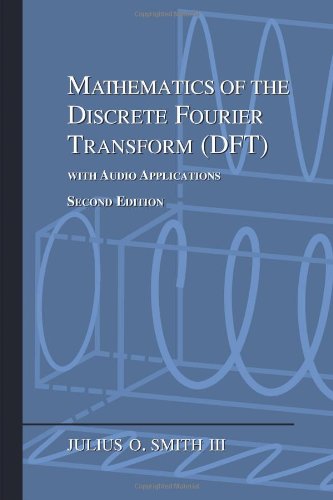The Uncertainty Principle
The uncertainty principle (for Fourier transform pairs) follows immediately from the scaling theorem. It may be loosely stated as
Time DurationwhereFrequency Bandwidth
c
If duration and bandwidth are defined as the ``nonzero interval,''
then we obtain ![]() , which is not very useful. This conclusion
follows immediately from the definition of the Fourier transform
and its inverse in §B.2.
, which is not very useful. This conclusion
follows immediately from the definition of the Fourier transform
and its inverse in §B.2.
Duration and Bandwidth as Second Moments
More interesting definitions of duration and bandwidth are obtained
for nonzero signals using the normalized second moments of the
squared magnitude:
where
![\begin{eqnarray*}
\nonumber \\ [10pt]
\left\Vert\,x\,\right\Vert _2^2 &\isdef &...
...}^\infty \left\vert X(\omega)\right\vert^2 \frac{d\omega}{2\pi}.
\end{eqnarray*}](http://www.dsprelated.com/josimages_new/mdft/img1742.png)
By the DTFT power theorem, which is proved in a manner
analogous to the DFT case in §7.4.8, we have
![]() . Note that writing ``
. Note that writing ``
![]() '' and
``
'' and
``
![]() '' is an abuse of notation, but a convenient one.
These duration/bandwidth definitions are routinely used in physics,
e.g., in connection with the Heisenberg uncertainty principle.C.1Under these definitions, we have the following theorem
[52, p. 273-274]:
'' is an abuse of notation, but a convenient one.
These duration/bandwidth definitions are routinely used in physics,
e.g., in connection with the Heisenberg uncertainty principle.C.1Under these definitions, we have the following theorem
[52, p. 273-274]:
Theorem: If
![]() and
and
![]() as
as
![]() , then
, then
with equality if and only if
Proof: Without loss of generality, we may take consider ![]() to be real
and normalized to have unit
to be real
and normalized to have unit ![]() norm (
norm (
![]() ). From the
Schwarz inequality (see §5.9.3 for the discrete-time case),
). From the
Schwarz inequality (see §5.9.3 for the discrete-time case),
The left-hand side can be evaluated using integration by parts:

The second term on the right-hand side of Eq.![]() (C.3) can be
evaluated using the power theorem
(§7.4.8 proves the discrete-time case)
and differentiation theorem (§C.1 above):
(C.3) can be
evaluated using the power theorem
(§7.4.8 proves the discrete-time case)
and differentiation theorem (§C.1 above):


If equality holds in the uncertainty relation Eq.![]() (C.2), then
Eq.
(C.2), then
Eq.![]() (C.3) implies
(C.3) implies

Time-Limited Signals
If ![]() for
for
![]() , then
, then
Proof: See [52, pp. 274-5].
Time-Bandwidth Products are Unbounded Above
We have considered two lower bounds for the time-bandwidth product
based on two different definitions of duration in time. In the
opposite direction, there is no upper bound on time-bandwidth
product. To see this, imagine filtering an arbitrary signal with an
allpass filter.C.2 The allpass filter cannot affect
bandwidth
![]() , but the duration
, but the duration ![]() can be arbitrarily extended by
successive applications of the allpass filter.
can be arbitrarily extended by
successive applications of the allpass filter.
Next Section:
Introduction to Sampling
Previous Section:
Scaling Theorem























